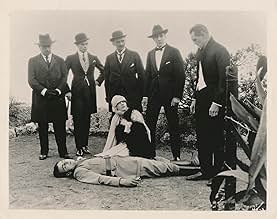Agrega una trama en tu idiomaA Russian prince has to flee his country after fighting a duel. He falls in love with a duchess, but becomes jealous when he finds out she has a lover.A Russian prince has to flee his country after fighting a duel. He falls in love with a duchess, but becomes jealous when he finds out she has a lover.A Russian prince has to flee his country after fighting a duel. He falls in love with a duchess, but becomes jealous when he finds out she has a lover.
- Premios
- 3 premios ganados en total
Jeanne Brindeau
- Madame Spadoni
- (as Madame Jean Brindeau)
Louis Wolheim
- Undetermined Secondary Role
- (escenas eliminadas)
Evelyn Arnold
- Dancer
- (sin créditos)
Maxina Arnold
- Dancer
- (sin créditos)
Constance Berry
- Polish Beauty
- (sin créditos)
Arline Booth
- Swedish Beauty
- (sin créditos)
Clara Bow
- Girl Dancing on Table
- (sin créditos)
- Dirección
- Guionistas
- Todo el elenco y el equipo
- Producción, taquilla y más en IMDbPro
Argumento
¿Sabías que…?
- TriviaAn incomplete 35mm print of this film exists at The Library of Congress.
- ConexionesReferenced in Clara Bow: Discovering the It Girl (1999)
Opinión destacada
Lionel Barrymore is a rich, degenerate Russian nobleman with gaggles of beautiful women hanging around his palace, dancing and playing harps and doing everything else for his pleasure. He thinks of nothing else. The only woman he likes is Alma Rubens, who also enjoys her pleasures. They have never gotten together because, as he puts it, they each want to dominate in their short relations, and that wouldn't work. After he kills her brother, he leaves Russia, first for Paris, then when the Great War breaks out, Monte Carlo. There he surrounds himself with like-minded male pleasure seekers; they call themselves 'the enemies of women.'
Monte itself has turned into a maelstrom of self-indulgence, fueled by the profits of war. Barrymore is amused that Miss Rubens has taken a young lover to herself. She doesn't know that the youth she lavishes her affection and the shrinking remnants of her fortune on is actually her son.
This movie is based on an Ibáñez novel. It is in poor shape. Twenty minutes of its length are missing, and large sections of the rest are in poor condition. Director Alan Crosland clearly has a big budget, and many beautiful women, including an early role for Clara Bow, and one for Margaret Dumont as one of a number of 'French beauties'. He lacks the flair for scenes of degeneracy that Demille had, and that Rex Ingram showed in THE FOUR HORSEMEN OF THE APOCALYPSE. Barrymore himself is pretty good, but it's odd to see him so physically active, stripping for a duel or wrestling with Ivan Linow... I've seen him in too many talkies, confined to a wheelchair, grumbling his lines.
Despite that, this movie remains watchable through its remaining length, if a bit simplistic and Bible-quoting. The print I saw, derived from one held by the Library of Congress, is probably the best available. It may be that the missing scenes would raise it to a major work of cinema, but, alas, we are confined to what we can actually see.
Monte itself has turned into a maelstrom of self-indulgence, fueled by the profits of war. Barrymore is amused that Miss Rubens has taken a young lover to herself. She doesn't know that the youth she lavishes her affection and the shrinking remnants of her fortune on is actually her son.
This movie is based on an Ibáñez novel. It is in poor shape. Twenty minutes of its length are missing, and large sections of the rest are in poor condition. Director Alan Crosland clearly has a big budget, and many beautiful women, including an early role for Clara Bow, and one for Margaret Dumont as one of a number of 'French beauties'. He lacks the flair for scenes of degeneracy that Demille had, and that Rex Ingram showed in THE FOUR HORSEMEN OF THE APOCALYPSE. Barrymore himself is pretty good, but it's odd to see him so physically active, stripping for a duel or wrestling with Ivan Linow... I've seen him in too many talkies, confined to a wheelchair, grumbling his lines.
Despite that, this movie remains watchable through its remaining length, if a bit simplistic and Bible-quoting. The print I saw, derived from one held by the Library of Congress, is probably the best available. It may be that the missing scenes would raise it to a major work of cinema, but, alas, we are confined to what we can actually see.
- boblipton
- 15 feb 2020
- Enlace permanente
Selecciones populares
Inicia sesión para calificar y agrega a la lista de videos para obtener recomendaciones personalizadas
Detalles
Taquilla
- Total en EE. UU. y Canadá
- USD 476,080
- Tiempo de ejecución1 hora 45 minutos
- Color
- Mezcla de sonido
- Relación de aspecto
- 1.33 : 1
Contribuir a esta página
Sugiere una edición o agrega el contenido que falta

Principales brechas de datos
By what name was Enemies of Women (1923) officially released in Canada in English?
Responda

















